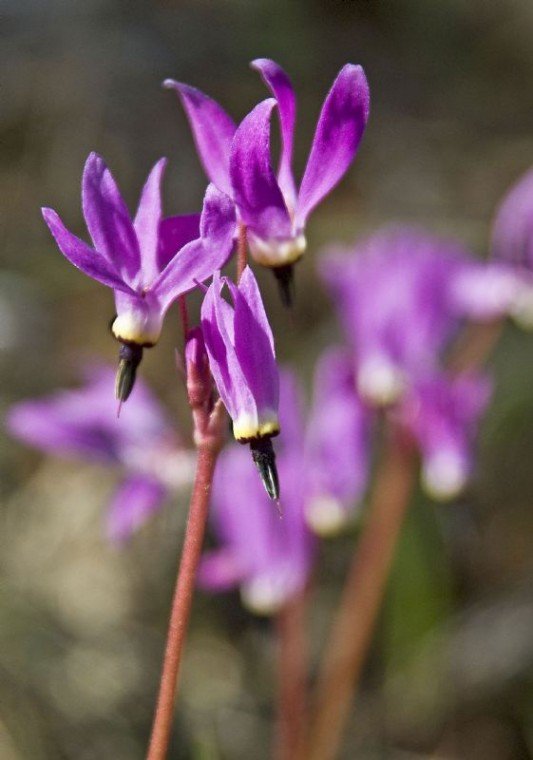Friends who know I enjoy spring wildflowers will sometimes call
me and ask where to go to see a fine spring display.
Friends who know I enjoy spring wildflowers will sometimes call me and ask where to go to see a fine spring display. I believe that my advice, if taken, is often a disappointment, because most people are hoping for carpets of unbroken color stretching across vast fields as in some heavenly dream. In my limited wanderings, I have seen such a sight only a few times and only after spending a considerable time driving to a distant location.
If wildflowers hold only a passing interest for you, a clump of color here and there probably won’t rev you up. But, as the hackneyed metaphor goes, if you look closer – peel back the layers – there is a fascinating world to discover.
I found that as I walked along trails in my youth, seeing different flowers again and again, I couldn’t help but wonder who (yes, who) they were. After all, we are companions hurtling through space together on this particular planet. It only seemed polite to introduce myself – maybe even make a friend.
Shy as they are, I took it upon myself to make the first move and learn their names. Slowly, I began to remember a few – lupine, larkspur, shooting star – but there was often more than one of each kind. It helped to learn that each plant is a member of a family. As I learned the traits of various families, I began to recognize who was related to whom. After a while, I began to feel a cross-kingdom connection with my newfound friends.
Last week, I walked a short loop at Henry Coe State Park east of Morgan Hill to visit some old friends and make some new ones. There were no impressive carpets of flowers, but there was a great variety mingling here and there in small groups.
From the visitor center, I started up the Monument Trail toward the top of Pine Ridge and my favorite spot in the park, Eric’s Bench. In among the grasses there, bunches of sword-like leaves cradled beautiful blue ground irises. No Miracle-Gro or careful cultivation; these elegant beauties do it all on their own.
Two species of violet mingle there. By the trees is the lemon-yellow oak violet. In the open fields is the slightly larger and more orange-yellow Johnny jump-up. Look closely, and you’ll see the difference.
Things seem to be happening later this season, which is not surprising since spring has been acting a lot like winter. Woodland shooting stars are usually gone by now, but I found plenty of fresh ones as I walked down the backside of Pine Ridge toward Frog Lake. Further down, parasitic Indian warriors, which can easily be mistaken for Indian paintbrush, waved their gaudy red blossoms underneath their manzanita hosts.
The most exotic and unusual spectacle of my walk was along the last straight stretch of trail before I reached the trickle of the Little Fork of Coyote Creek. On the left, near an oak with large down-fallen limbs is a gathering of exotic giant trillium. Picture a whorl of three large leaves suspended above the ground like a waiter’s tray with a solitary reddish flower sitting erect and proud at the center.
I returned along the Flat Frog Trail, a longer but flat route back. While I risk offending some of my friends by not mentioning them all, look for spreading larkspur, hound’s tongue, common linanthus, California saxifrage (look closely, they’re small), blue-eyed grass, etc.
For pain-free flower identification, the Coe Park visitor center sells a great folding color cheat sheet for $3. It has all the flowers you are likely to see. You’ll be surprised. You’ll have fun.














